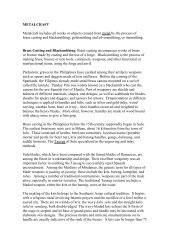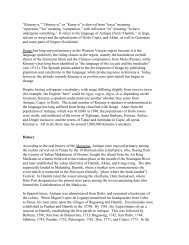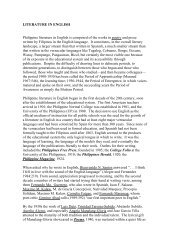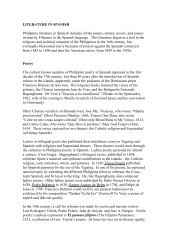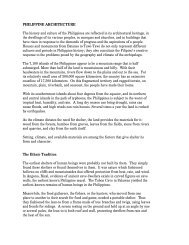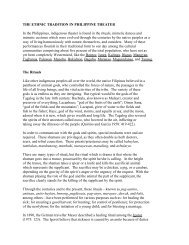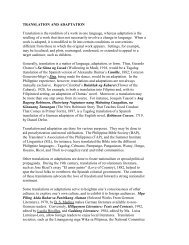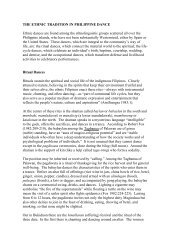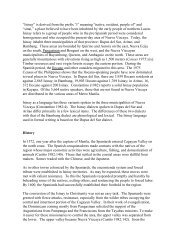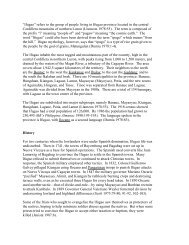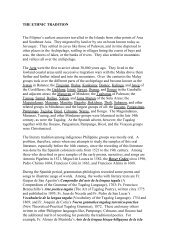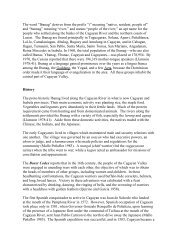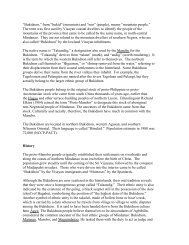The Tboli, also known as T'boli, Tiboli, and Tagabili, are an old ...
The Tboli, also known as T'boli, Tiboli, and Tagabili, are an old ...
The Tboli, also known as T'boli, Tiboli, and Tagabili, are an old ...
Create successful ePaper yourself
Turn your PDF publications into a flip-book with our unique Google optimized e-Paper software.
in-flight pattern); the tofi (frog); the klung (shield); the sawo (snakeskin); <strong><strong>an</strong>d</strong> the<br />
b<strong>an</strong>gala (hum<strong>an</strong> figure within the home pattern).<br />
Samples of <strong>Tboli</strong> decorative painting may be found in the lungon of dead <strong>Tboli</strong>. <strong>The</strong><br />
paintings reveal the nature of the dece<strong>as</strong>ed person’s occupation. If the dead w<strong>as</strong> a<br />
farmer, the lungon would be festooned with pictures of rice, camote, corn, <strong><strong>an</strong>d</strong> farm<br />
implements. If the dead w<strong>as</strong> a hulong kulo or poet, the lungon would be painted<br />
with representations of the moon <strong><strong>an</strong>d</strong> stars. If the dead w<strong>as</strong> a metalworker, one<br />
would find solon (hammer), sufit (pincers), ind<strong>as</strong><strong>an</strong> (<strong>an</strong>vil), <strong><strong>an</strong>d</strong> fire among the designs.<br />
Literary Arts<br />
<strong>Tboli</strong> folk literature reflects the typical beliefs, customs, <strong><strong>an</strong>d</strong> traditions of their society.<br />
Practically every <strong>as</strong>pect of <strong>Tboli</strong> life is governed by folk beliefs <strong><strong>an</strong>d</strong> sayings. <strong>The</strong>se<br />
proverbs <strong>are</strong> often b<strong>as</strong>ed on nonsequiturs, <strong><strong>an</strong>d</strong> the non-<strong>Tboli</strong> who tries to decipher<br />
them might be perplexed. While cooking <strong><strong>an</strong>d</strong> eating, this is spoken:<br />
while hunting:<br />
Don’t throw rice away,<br />
otherwise there will be a famine.<br />
If you catch a wild boar, eat its heart,<br />
or you will never catch <strong>an</strong>other.<br />
<strong><strong>an</strong>d</strong> while pl<strong>an</strong>ting:<br />
Pl<strong>an</strong>t during low tide,<br />
otherwise you will not have a harvest.<br />
Lessons <strong>are</strong> taught through countless folktales. In “Ana ne Tau Bawik” (Ana <strong><strong>an</strong>d</strong> the<br />
Spirit of the Dead), the husb<strong><strong>an</strong>d</strong> learns never to leave his pregn<strong>an</strong>t wife alone to the<br />
wiles of the busao; in “Walo Nga Libun” (Eight Maidens), “Bulol Hulon” (Mount<br />
Hulon), “Oko ne Ye’en” (Oko <strong><strong>an</strong>d</strong> His Mother), “Kwaay,” “Kramel,” <strong><strong>an</strong>d</strong><br />
“Krongoy,” the children <strong>are</strong> taught methods of hunting.<br />
<strong>The</strong> <strong>Tboli</strong> folktale “Why Animals Are Afraid of People” explains the relationship<br />
of <strong>an</strong>imals <strong><strong>an</strong>d</strong> hum<strong>an</strong> beings. <strong>The</strong>re w<strong>as</strong> once a time when the people did not have<br />
to hunt because a wise m<strong>an</strong>, Heye We, befriended the <strong>an</strong>imals <strong><strong>an</strong>d</strong> convinced them<br />
to sh<strong>are</strong> some of their meat with people. This the <strong>an</strong>imals did by allowing Heye We<br />
to slice off portions of their flesh. But one day, <strong>an</strong> evil m<strong>an</strong>, Sidek We, beg<strong>an</strong> killing<br />
the <strong>an</strong>imals because he w<strong>an</strong>ted to eat all of their meat. Despite the <strong>an</strong>imals’ ple<strong>as</strong>,<br />
Sidek We would not listen. Afraid for their lives, the <strong>an</strong>imals r<strong>an</strong> away into the forest,<br />
<strong><strong>an</strong>d</strong> from then on, hum<strong>an</strong> beings had to hunt them.<br />
Another story excoriating greed is about a prosperous but selfish male witch,



